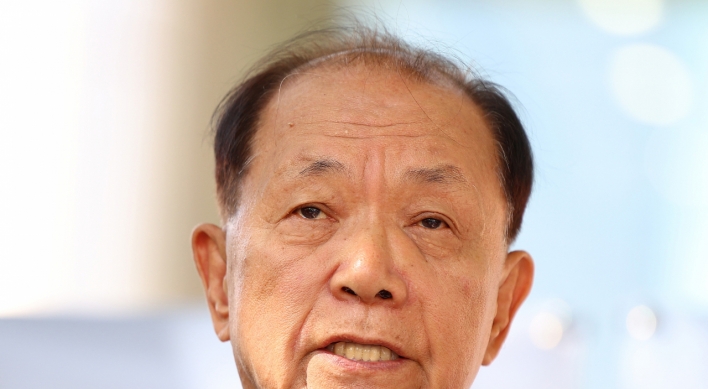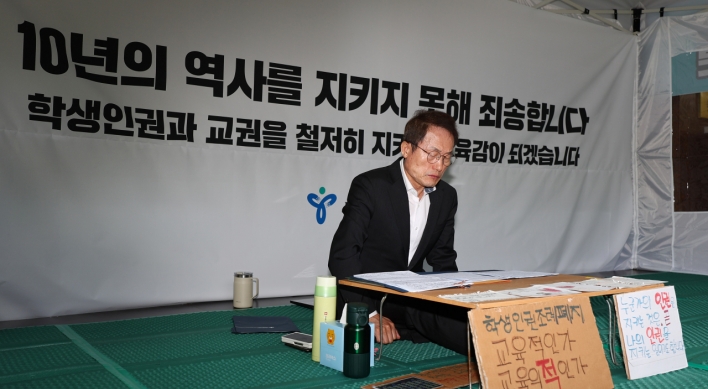“It’s China’s fault,” I hear every time smog and yellow dust envelop the Korean Peninsula, which happens all too frequently in spring. So I read Matthew Shapiro’s “Dust in the Wind, Solution in the Lab” (Opinion, April 19) with hopes that a new voice would counter this myopic chorus.
Unfortunately, Shapiro fails to mention anything about Korea’s own direct contribution to this combined pollution even though numerous reports in 2015 illustrated the fact that Korea contributes to its own harmful air.
Last March, Greenpeace, citing research conducted with Harvard University, stated that 50 to 70 percent of fine particle dust (PM2.5) is generated by Korea’s domestic coal power plants. And, in fact, Korea, which now has some 50 of these plants, plans to build a dozen more by 2021 as part of an energy plan launched in 2013, according to Yonhap. While pointing out these facts as part of its campaign against such an expansion, Greenpeace emphasized that, “Korea stands out as one of the developed nations with the biggest plans for new coal.” Shapiro offers nary a word about this.
In addition, World Coal magazine ran an article last May titled “South Korea’s power boost” in which it lauded the country’s increasing consumption of coal. Among the many plaudits, including one for the plan to build 12 new plants, the article concludes by stating, “(w)ith coal consumption having expanded by 55% between 2005 and 2012 and further increases planned, South Korea’s coal outlook remains promising.”
Is this an endorsement Korea wants?
A December report by the International Energy Agency listed South Korea as the world’s fifth largest consumer of coal with a per capita consumption in 2014 that was higher than China’s and double the Organization for Economic Cooperation and Development average.
The report offered little praise for Korea’s increasing consumption of coal, which produces more greenhouse gases that harm the environment and contribute to health problems such as heart disease, strokes, and lung cancer.
As part of its ongoing campaign to encourage the South Korean government to rely less on coal and start planning for more renewable energy, Greenpeace stated that the government should stop placing all the blame on China “without having any strategies to tackle the problem itself” here at home.
Shapiro does suggest some strategies but none of them is aimed at Korea’s pro-coal policies. Sure, we have to promote science and bring it to bear on the pollution problems that affect Northeast Asia. To that add the scientific fact that Korea pollutes its own skies. And with that truth should come the necessity for a campaign to prompt the government to develop strategies that encourage clean, renewable and health conscious policies.
By John M. Rodgers
John M. Rodgers, a teacher at the Hankuk Academy of Foreign Studies in Yongin
Unfortunately, Shapiro fails to mention anything about Korea’s own direct contribution to this combined pollution even though numerous reports in 2015 illustrated the fact that Korea contributes to its own harmful air.
Last March, Greenpeace, citing research conducted with Harvard University, stated that 50 to 70 percent of fine particle dust (PM2.5) is generated by Korea’s domestic coal power plants. And, in fact, Korea, which now has some 50 of these plants, plans to build a dozen more by 2021 as part of an energy plan launched in 2013, according to Yonhap. While pointing out these facts as part of its campaign against such an expansion, Greenpeace emphasized that, “Korea stands out as one of the developed nations with the biggest plans for new coal.” Shapiro offers nary a word about this.
In addition, World Coal magazine ran an article last May titled “South Korea’s power boost” in which it lauded the country’s increasing consumption of coal. Among the many plaudits, including one for the plan to build 12 new plants, the article concludes by stating, “(w)ith coal consumption having expanded by 55% between 2005 and 2012 and further increases planned, South Korea’s coal outlook remains promising.”
Is this an endorsement Korea wants?
A December report by the International Energy Agency listed South Korea as the world’s fifth largest consumer of coal with a per capita consumption in 2014 that was higher than China’s and double the Organization for Economic Cooperation and Development average.
The report offered little praise for Korea’s increasing consumption of coal, which produces more greenhouse gases that harm the environment and contribute to health problems such as heart disease, strokes, and lung cancer.
As part of its ongoing campaign to encourage the South Korean government to rely less on coal and start planning for more renewable energy, Greenpeace stated that the government should stop placing all the blame on China “without having any strategies to tackle the problem itself” here at home.
Shapiro does suggest some strategies but none of them is aimed at Korea’s pro-coal policies. Sure, we have to promote science and bring it to bear on the pollution problems that affect Northeast Asia. To that add the scientific fact that Korea pollutes its own skies. And with that truth should come the necessity for a campaign to prompt the government to develop strategies that encourage clean, renewable and health conscious policies.
By John M. Rodgers
John M. Rodgers, a teacher at the Hankuk Academy of Foreign Studies in Yongin





![[KH Explains] No more 'Michael' at Kakao Games](http://res.heraldm.com/phpwas/restmb_idxmake.php?idx=644&simg=/content/image/2024/04/28/20240428050183_0.jpg&u=20240428180321)












![[Herald Interview] Mistakes turn into blessings in street performance, director says](http://res.heraldm.com/phpwas/restmb_idxmake.php?idx=652&simg=/content/image/2024/04/28/20240428050150_0.jpg&u=20240428174656)
